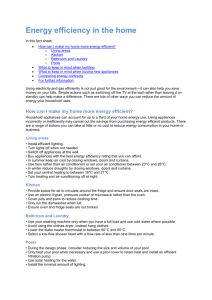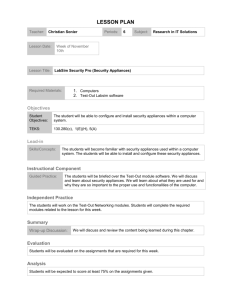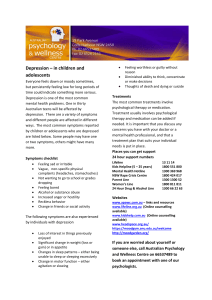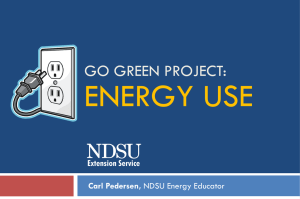Energy efficiency in the home
advertisement
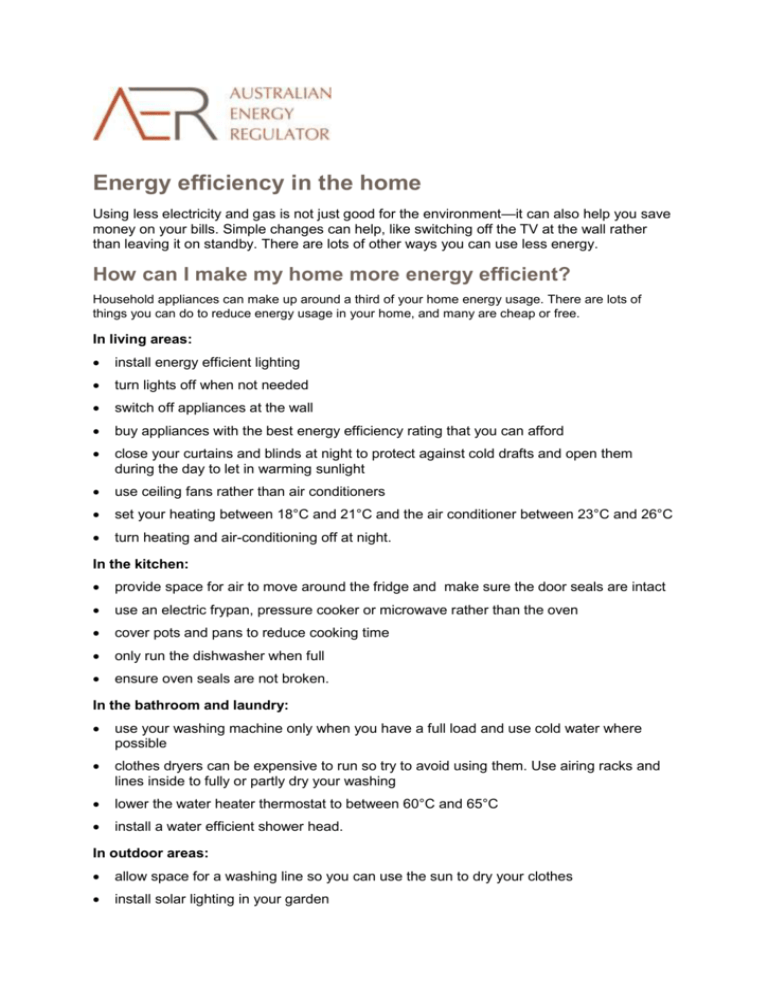
Energy efficiency in the home Using less electricity and gas is not just good for the environment—it can also help you save money on your bills. Simple changes can help, like switching off the TV at the wall rather than leaving it on standby. There are lots of other ways you can use less energy. How can I make my home more energy efficient? Household appliances can make up around a third of your home energy usage. There are lots of things you can do to reduce energy usage in your home, and many are cheap or free. In living areas: install energy efficient lighting turn lights off when not needed switch off appliances at the wall buy appliances with the best energy efficiency rating that you can afford close your curtains and blinds at night to protect against cold drafts and open them during the day to let in warming sunlight use ceiling fans rather than air conditioners set your heating between 18°C and 21°C and the air conditioner between 23°C and 26°C turn heating and air-conditioning off at night. In the kitchen: provide space for air to move around the fridge and make sure the door seals are intact use an electric frypan, pressure cooker or microwave rather than the oven cover pots and pans to reduce cooking time only run the dishwasher when full ensure oven seals are not broken. In the bathroom and laundry: use your washing machine only when you have a full load and use cold water where possible clothes dryers can be expensive to run so try to avoid using them. Use airing racks and lines inside to fully or partly dry your washing lower the water heater thermostat to between 60°C and 65°C install a water efficient shower head. In outdoor areas: allow space for a washing line so you can use the sun to dry your clothes install solar lighting in your garden use planting to create shaded areas to protect the inside of your home from direct sun. When building or renovating: insulate ceilings and walls to retain warm air in winter and cool air in summer install energy efficient LED and compact fluorescent lighting replace older appliances with more energy efficient appliances invest in an efficient hot water system—either solar, gas or heat pump. Quick tip You may be able to get a grant or rebate for energy saving equipment that you install in your home. Visit the Australian Government’s Your Energy Savings website (www.yourenergysavings.gov.au) for details about grants and rebates available in your state or territory. What to keep in mind when buying new appliances New appliances, especially for heating and cooling your home, can be expensive. Take some time to choose the right appliance for your needs. Appliances with a higher energy efficiency rating may cost more to buy but lower running costs will mean you save energy and money. For further information about choosing energy efficient appliances, see the Australian Government’s Energy Rating website (www.energyrating.gov.au). Comparing energy contracts Another way to save money on your energy is to shop around and compare energy contracts. Before you decide to change retailers you should: check the length of the offer and price check if there are early exit fees check payment details and if you can get discounts consider if it is the right offer based on your energy usage talk about it with someone else (family, friends etc.) before deciding find out if you need to pay a security deposit and how much it is check if you will receive one bill if you choose to have gas and electricity from the same retailer check how you can pay (direct debit, Centrepay, electronic transfer and post offices). Ask if there are any extra fees for the different ways to pay. Quick tip Energy Made Easy (www.energymadeeasy.gov.au) is the Australian Government’s free, independent website where you can compare electricity offers. Energy Made Easy also provides tips on energy efficiency. More information Australian Energy Regulator AER Infoline 1300 585 165 AER website www.aer.gov.au Energy Made Easy www.energymadeeasy.gov.au Other contacts Indigenous Infoline 1300 303 143 For information in languages other than English call 13 1450 and ask for 1300 585 165 Speak and Listen users phone 1300 555 727 and ask for 1300 585 165 TTY users phone 13 3677 and ask for 1300 585 165 Internet relay users connect to the National Relay Service (www.relayservice.com.au) and ask for 1300 585 165 Australian and state and territory government contacts Government websites that provide information on ways to save energy, grants and rebates, solar power and other energy saving initiatives. Australian Government Department of Industry and Science www.yourenergysavings.gov.au/energy For detailed information on efficient appliance use and home design tips, see the Australian Government’s Your Home website: www.yourhome.gov.au/energy Australian Capital Territory Environment and Sustainable Development www.environment.act.gov.au www.actsmart.act.gov.au New South Wales Office of Environment and Heritage www.environment.nsw.gov.au/households Northern Territory Department Lands, Planning and Environment www.dlp.nt.gov.au Queensland Department of Energy and Water Supply www.dews.qld.gov.au/energy-water-home/energy-saving South Australia Government of South Australia www.sa.gov.au/energy Tasmania Department of State Growth www.stategrowth.tas.gov.au Victoria Department of Economic Development, Jobs, Transport and Resources www.energyandresources.vic.gov.au/energy Sustainability Victoria www.sustainability.vic.gov.au Western Australia Department of Finance—Public Utilities Office www.finance.wa.gov.au
